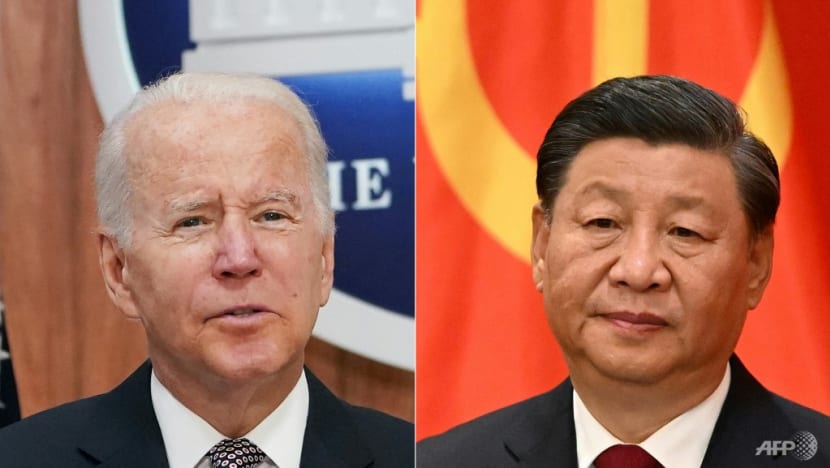
A composite photo showing US President Joe Biden and Chinese President Xi Jinping. (Photos: AFP)
China has slammed US President Joe Biden for equating Xi Jinping to “dictators” when discussing the alleged Chinese spy balloon incident. The coming weeks will show if diplomatic efforts have been thrown off course, says Yale-NUS College senior lecturer Trisha Craig.

A composite photo showing US President Joe Biden and Chinese President Xi Jinping. (Photos: AFP)
SINGAPORE: United States President Joe Biden has a reputation for putting his foot in his mouth. Sometimes his gaffes are harmless and quickly corrected, as was the case earlier this year when he praised China but meant Canada, in a speech to the Canadian parliament. At other times, there could be more dramatic consequences.
Such was the case on Tuesday (Jun 20) when he equated Chinese President Xi Jinping with “dictators”. With this coming just a day after US Secretary of State Antony Blinken wrapped up a trip to China aimed at easing tensions between the two countries, the timing was inopportune.
China responded by calling the remark a serious violation of “China’s political dignity”, an “open political provocation” and "extremely absurd and irresponsible", with the foreign ministry echoing some of its language in response to Mr Biden’s comments on the alleged spy balloon incident in February.
The meeting between the US’s top diplomat and the Chinese leader on Monday had been seen as progress or at least a reset to pre-balloon relations, even if it ended without any concrete agreements.
Mr Blinken’s visit, postponed after a high-altitude Chinese surveillance device traversed US airspace for a week, was intended to calm the fraught geopolitical waters, strengthen communication and explore areas of common interest where cooperation could be possible.
Yet despite the warm words and intentions exchanged for more high-profile visits in the coming weeks, fundamentally nothing has changed - as the immediate aftermath shows. Even if the matter ends with the strong denunciation from Beijing, this incident highlights the precarious nature of the relationship between the world’s two superpowers.
Mr Biden’s words may rankle, but so did the Wall Street Journal report immediately following Mr Blinken’s visit that China plans to open a military training facility in Cuba, about 145km from the Florida coast. Nothing about Blinken-Xi meeting should suggest that US and China will neglect to pursue their own interests.
Mr Biden’s “dictator” remark is against protocol, and to the extent that it makes some of his goals vis-a-vis relations with China more difficult to achieve, a mistake. However, it is very much in keeping with his more general view about China and US interests.
For Mr Biden, a central tenet of his foreign policy is that the competition between democracies and autocracies is a primary global struggle that will define the future, and that both America and the world are better off and more secure with a strong US capable of rallying democratic allies to meet contemporary challenges.
Thus, while Mr Biden’s choice of language is ill-advised, it highlights the divide he sees between the US and China.
There is no question that words can stoke tensions. Mr Biden’s statement that the US would come to Taiwan’s aid if China were to launch an unprovoked attack annoys Beijing and sends US diplomats and aides into a frenzy of clarification that US policy on “One China” has not changed.
Yet, having repeated the same “misstatement” on several occasions, Mr Biden is sending a message of a more assertive US foreign policy.
While such messages are potentially destabilising for foreign policy, it is important to remember that they usually play well to a domestic audience. Mr Biden’s remark are unlikely to give him problems at home.
This particular incident occurred in the context of Mr Biden talking with donors about his re-election campaign, as he offered commentary and explanations about the balloon incident.
As this is a matter that is officially closed between the two countries, China may find it distasteful to still be talking about it.
Yet for Mr Biden on the campaign trail, it is a memorable incident that allows him to remind supporters of his strong stance towards China, something that plays well with the American public across the political spectrum.
The coming weeks will give some indication of whether Mr Biden’s latest remarks - gaffe or not - have thrown diplomatic efforts off course. A good indication will be whether planning continues for a number of expected high-level visits such as US Treasury Secretary Janet Yellen’s trip to China or Chinese Foreign Minister Qin Gang’s visit to Washington.
Regardless, the tough talk about China is unlikely to abate, even as diplomats work to lower the tensions and find areas of common interest.
Trisha Craig is Vice President (Engagement) and Senior Lecturer of Social Sciences (Global Affairs) at Yale-NUS College. The views and opinions expressed herein are those of the author(s) and do not represent the views and opinions of Yale-NUS College or any of its subsidiaries or affiliates.